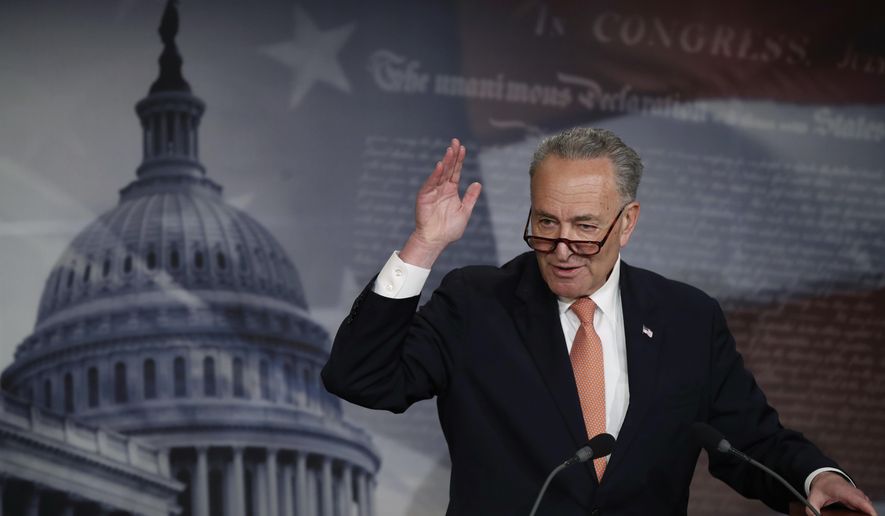Democrats won the latest shutdown showdown fight, triumphing over President Trump on nearly every major issue in the $1 trillion spending bill negotiators announced early Monday.
Mr. Trump emerged with more money for the Pentagon, but the funds will be tacked onto the deficit rather than offset by the deep domestic cuts the president sought. Mr. Trump also failed to get any money for his border wall and was forced to agree to make “unauthorized” Obamacare payments.
Democrats, meanwhile, struggled to think of a single major fight they lost — and couldn’t come up with any significant defeat in the bill.
“Overwhelmingly, we were very pleased with the outcome — issue after issue,” said Senate Minority Leader Charles E. Schumer, New York Democrat. “I would not say there’s a major loss in here.”
The bill partially bails out Puerto Rico’s Medicaid program, boosts spending for the National Endowment for the Arts, increases the National Institutes of Health budget by $2 billion, restores year-round access to Pell Grants for college students with financial need and keeps the Environmental Protection Agency’s budget intact — fending off Mr. Trump’s efforts to trim the agency’s operations.
Congress must pass the bill before the end of Friday, which is when funding from a one-week stopgap bill expires.
The president and his defenders were left to claim victory on a $1.5 billion boost in Homeland Security funding and $15 billion extra for the Defense Department — about half of what the president wanted. The White House said it was the first step in Mr. Trump’s promise to rebuild the military.
“I think it’s great that the Democrats like the bill. That’s fantastic. We thought it was a really good deal for this administration as well,” said Mick Mulvaney, Mr. Trump’s budget director.
“Can you imagine how different this bill is from what President Obama would have signed back in September?” he said.
Democrats, though, said Republicans probably got a worse deal by waiting. They said members of both parties were prepared to pass a bill in December but Mr. Trump’s team asked that the legislation be delayed so he could have a say.
But now, with their party in control of all the levers of government, Republicans were scared of being blamed for a shutdown. Democrats used that threat to the fullest, forcing Republicans to back down on nearly every major scuffle.
“We made it clear that if the government shut down, it would be on the Republicans’ backs,” Mr. Schumer said. “That became the general consensus, and that gave us real leverage, even though we were in the minority.”
He said Democrats forged a partnership with congressional Republicans, who were just as eager to keep the taxpayer spigot flowing to their own priorities. The two sides agreed to increase spending overall, rejecting Mr. Trump’s efforts to streamline his administration.
Both sides crowed about more money to combat the opioid epidemic and a $2 billion boost to the National Institutes of Health, which Mr. Trump had targeted for trimming.
Mr. Trump’s base felt a familiar twinge of disappointment with the Republican team on Capitol Hill.
“They’ve allowed the minority to win again. For some reason, with the Republicans it doesn’t matter what size majority we have; we always lose. The Republicans, without question, are the world’s worst negotiators and marketers,” said Ken Crow, a national tea party leader and editor of Crows Nest Politics website.
“Paul Ryan is an abysmal failure. The conservative grass roots absolutely dislike him with a passion,” said Mr. Crow, who backed Mr. Trump in the presidential race. “We feel like Donald Trump is capitulating to Paul Ryan right now, and we don’t like that. He’s the president. He needs to stand up and be a leader.”
Perhaps the biggest failure for Mr. Trump was his inability to win any money for his border wall.
Instead, the bill spends an additional $1.5 billion on other Homeland Security Department programs, envisioning a boost in deportation officers and detention space to hold illegal immigrants.
Mr. Mulvaney said border money will pay for repair or construction of roads, bridges, gates and lighting that he said lays infrastructure for the wall to be built eventually. He said the money was a signal to Congress.
“This is not just demagoguery. We are serious about securing the border,” he said.
He touted a three-year extension of the D.C. school choice program, which he said Republicans secured in last-minute haggling in exchange for Democrats’ demands for assistance to Puerto Rico. The island territory received $295 million to bail out its Medicaid program this year, and the D.C. Opportunity Scholarships Program got $45 million to be spread out over three years.
Mr. Mulvaney said Mr. Trump ran on school choice and the pending deal sent “a tremendous message to the school choice community.”
“He’s done exactly what he said he would do,” he said.
Mr. Trump also retreated on the Republican promise to defund Planned Parenthood. Mr. Mulvaney said they sat down with pro-life lawmakers and advocates and came to the conclusion that it was a fight best engaged as part of the bill to repeal and replace Obamacare.
The National Endowment for the Arts, the National Endowment for Humanities and the Appalachian Regional Commission all pocket small funding increases. Mr. Trump wanted to eliminate them.
“One thing [Mr. Trump] learned is people love to spend other people’s money,” said Jim McLaughlin, a Republican strategist and pollster who previously advised a pro-Trump super PAC.
He said the president still deserves credit for altering the direction of the federal government.
“This is a very different budget than you would have gotten with Hillary Clinton as president,” he said.
• Stephen Dinan can be reached at sdinan@washingtontimes.com.
• S.A. Miller can be reached at smiller@washingtontimes.com.




Please read our comment policy before commenting.